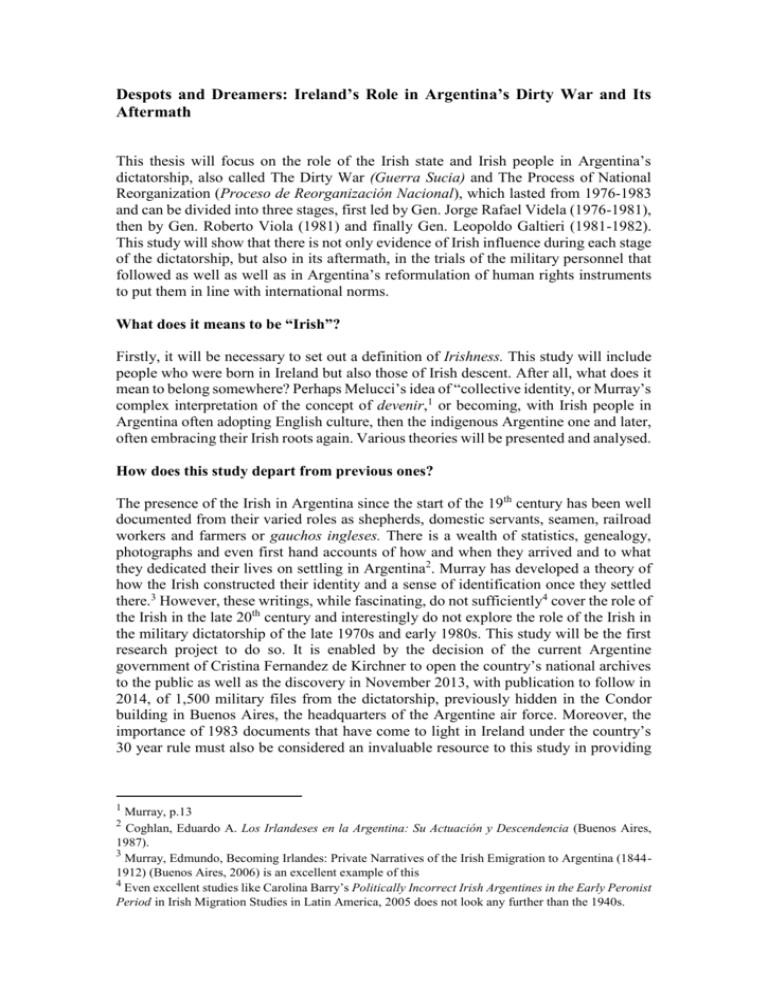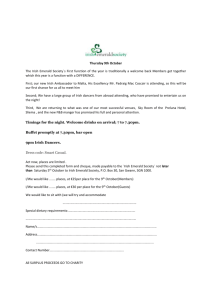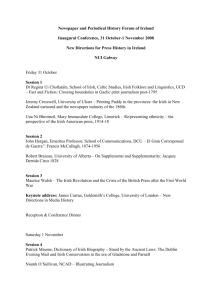Despots and Dreamers: Ireland`s Role in
advertisement

Despots and Dreamers: Ireland’s Role in Argentina’s Dirty War and Its Aftermath This thesis will focus on the role of the Irish state and Irish people in Argentina’s dictatorship, also called The Dirty War (Guerra Sucia) and The Process of National Reorganization (Proceso de Reorganización Nacional), which lasted from 1976-1983 and can be divided into three stages, first led by Gen. Jorge Rafael Videla (1976-1981), then by Gen. Roberto Viola (1981) and finally Gen. Leopoldo Galtieri (1981-1982). This study will show that there is not only evidence of Irish influence during each stage of the dictatorship, but also in its aftermath, in the trials of the military personnel that followed as well as well as in Argentina’s reformulation of human rights instruments to put them in line with international norms. What does it means to be “Irish”? Firstly, it will be necessary to set out a definition of Irishness. This study will include people who were born in Ireland but also those of Irish descent. After all, what does it mean to belong somewhere? Perhaps Melucci’s idea of “collective identity, or Murray’s complex interpretation of the concept of devenir,1 or becoming, with Irish people in Argentina often adopting English culture, then the indigenous Argentine one and later, often embracing their Irish roots again. Various theories will be presented and analysed. How does this study depart from previous ones? The presence of the Irish in Argentina since the start of the 19th century has been well documented from their varied roles as shepherds, domestic servants, seamen, railroad workers and farmers or gauchos ingleses. There is a wealth of statistics, genealogy, photographs and even first hand accounts of how and when they arrived and to what they dedicated their lives on settling in Argentina2. Murray has developed a theory of how the Irish constructed their identity and a sense of identification once they settled there.3 However, these writings, while fascinating, do not sufficiently4 cover the role of the Irish in the late 20th century and interestingly do not explore the role of the Irish in the military dictatorship of the late 1970s and early 1980s. This study will be the first research project to do so. It is enabled by the decision of the current Argentine government of Cristina Fernandez de Kirchner to open the country’s national archives to the public as well as the discovery in November 2013, with publication to follow in 2014, of 1,500 military files from the dictatorship, previously hidden in the Condor building in Buenos Aires, the headquarters of the Argentine air force. Moreover, the importance of 1983 documents that have come to light in Ireland under the country’s 30 year rule must also be considered an invaluable resource to this study in providing 1 Murray, p.13 Coghlan, Eduardo A. Los Irlandeses en la Argentina: Su Actuación y Descendencia (Buenos Aires, 1987). 3 Murray, Edmundo, Becoming Irlandes: Private Narratives of the Irish Emigration to Argentina (18441912) (Buenos Aires, 2006) is an excellent example of this 4 Even excellent studies like Carolina Barry’s Politically Incorrect Irish Argentines in the Early Peronist Period in Irish Migration Studies in Latin America, 2005 does not look any further than the 1940s. 2 new and, possibly groundbreaking, insight into the attitudes and actions of the Fine Gael/Labour government of the time. In order to undertake this project, it will be necessary to depart from previous studies5 which have been involved in the “qualification and categorization.”6of the Irish in Argentina locating them as shepherds and railway workers and focus on them instead as constructors of ideology in their roles as thinkers and professionals such as lawyers, journalists and politicians. In other words, this will mark their departure from the Marxist base7 to the superstructure of Argentine society. We will look at, for example, the opening of the first Irish Embassy in Buenos Aires in 1947 as the start of diplomatic relations between the two countries. Taylor8 suggests that the political, social and judicial fields “combined to rule” Argentine society from 1976 until 1983. These seven years saw Argentina’s military dictatorship wage a brutal campaign against suspected left-wing political opponents during which it is estimated9 that between 10,000 and 30,000 people disappeared10 and approximately 500 babies11 were said to have been taken from their mothers in these detention centres and given to military families. What was the Irish role in this campaign? This study will be the first academic study to locate Irish people as supporters of the military dictatorship. When necessary, Irish ancestry will also be traced in the thesis.12My preliminary list includes General Suarez Mason, a son of Irish immigrants to Argentina, head of the Army Corps during Galtieri’s dictatorship and one of his closest allies who was called the “Adolf Eichmann of Argentina”13 due to his involvement in torture and kidnapping during the period. Personal interviews, Irish embassy documents, official papers and newspaper archives of the time will be critical to unearth a more complete list as well as the extent of their support of the military regime during this period. This study will also explore Irish opposition to the dictatorship. We will look at the case of Patrick Rice, a Cork-born former priest and human rights activist who was captured and tortured in one of Buenos Aires’ infamous detention centres in October 1976 and was freed following the intervention of the Irish Embassy to Buenos Aires’ then third secretary Justin Harman. Does this case hint of an official Irish government stance against the Argentine military dictatorship? What government papers exist to this 5 For example, Murray. Page 3 7 Marx, Karl, A Contribution To The Critique of Social Economy, 1859. 8 Taylor, Helen, page 12. 9 Exact figures do not exist because most bodies have never been located. Argentina’s National Commission on the Disappearance of Persons estimates that around 13,000 disappeared during this time. 10 A first hand account by Argentine naval officer Adolfo Scilingo stated that there were 180-200 death flights in the years 1977 and 1978 where dissidents were drugged and pushed from planes into the Atlantic Ocean or Rio de la Plata river. 11 This list was compiled by the campaign group Grandmothers of the Plaza de Mayo. 12 Irish scholar Guillermo MacLoughlin 12 will assist me in this regard by giving me access to his documents of Irish family trees in Argentina. 13 This name was given to him by former detention centre prisoners. 6 effect? Was this an isolated intervention by the Embassy or were there others? This study will endeavour to answer all of these questions. This investigation will also include Irish of Argentine descent who opposed the dictatorship. Journalist Rodolfo Walsh, who was shot dead during the Dirty War, is the most prominent example. However, this investigation will also include 21 year old short story writer Gloria Kehoe Wilson who disappeared in 1977, among others who will be unearthed during the course of this three-year investigation. What were their objections to the dictatorship? Did they receive support from the Irish state or any Irish groups? These issues will be investigated in this thesis? Possible challenges Finally, I understand that this thesis could be criticised on the grounds that it is parochially Irish. I am currently considering a number of responses to this criticism. 1. Perhaps the role of another or other post-colonial countries in the dictatorship could be considered. There is a wealth of post-colonial writing that could be analysed to explain the connection between Argentina and other post-colonial countries. 2. This study could be framed by Ireland's international role in development and human rights in tandem with the role of Irish emigrants (and their descendants) and Irish priests who have been very prominent in various countries in Latin America. 3. This thesis could also be investigated in terms of the broader, more international, impact of policies that were to the forefront of the Irish state at the time. For example, Pat Rice’s activism and kidnapping in Argentina took place at a time (1976) when the IRA issue was to the forefront of Irish politics and this role will need to be addressed. Also, it cannot be overlooked that the Taoiseach of Ireland at the start of dictatorship in Argentina was Liam Cosgrove, considered by many an anti-revolutionary conservative14 (evinced in his government’s reinforcement of Section 31 of Ireland’s 1971 Broadcasting Bill, which prevented the IRA and Sinn Fein from having access to the media). How did this ‘conservatism’ impact on his government’s stance on the dictatorship in Argentina? 4. We must also remember that The Falklands (Malvinas) War between Argentina and Britain (1982) took place during the Galtieri dictatorship, a time when Anglo-Irish relations were also strained following the death of 10 Irish Republican hunger strikers in Northern Ireland’s Long Kesh prison. Did the anti-English, anti-Thatcher, climate in Ireland at that time lead to sympathy towards the Argentine position? Was there support of any kind, verbal or financial, given to Argentina from Ireland during this conflict? This is another issue that could be considered. The Aftermath of the Past 14 The troubles: Ireland's ordeal, 1966-1996, and the search for peace By Tim Pat Coogan, Palgrave MacMillan, 2002 This study will also look at the role of the Irish in the trials that followed the dictatorship. A prime example of this is the role played by two Irish-Argentines, Alberto Rodriguez Varela (a maternal cousin of Che Guevara Lynch) and Lucas Lennon, as defense lawyers of Rafael Videla, defacto President of Argentina from 1976-1981. Ruti Teitel15 also sets out that following periods of authoritarian rule a legal response is not enough but that a combined constitutional, legislative, and administrative response is required. Was this the case in Argentina? What was the Irish involvement in these fields? These are some more questions that will be addressed in this thesis. Accounting for the past This study will explore the role played by the Irish government and Irish individuals in the establishment of human rights institutions in Argentina in the aftermath of the military dictatorship. For example, did they provide funding? Were they involved physically in establishing these institutions and organizations? What human rights institutions exist in Argentina today as a result of this Irish support? In 2005, the Argentine supreme court overturned two amnesty laws: The Full Stop Law of 1986 (Law No. 23,492) and the Due Obedience Law (Law No. 23,521) of 1987, which had granted immunity from prosecution to members of the military who had acted during the dictatorship. This study will seek to discover if there was Irish involvement in this groundbreaking act, whether from lawyers or politicians supporting it, civil society organisations with Irish members/funding or even the Irish government itself. What was happening in the Irish state at this time? Can we prove a link between the two histories? Research Questions Did the Irish government have an official stance on the military dictatorship in Argentina during the period from 1976-1983? At points did Irish embassy officials intervene in issues/situations related to the dictatorship? What Irish people supported the dictatorship? What Irish people were activists in Argentina against the dictatorship? Was their funding from the Irish state for any dictatorship or anti-dictatorship body? What was the extent of the Irish involvement in the change of legal framework following the dictatorship in Argentina (as it developed its model of transitional justice seeking to put itself in line with international human rights norms)? Methodology – Qualitative Analysis 15 Teitel, Ruti. G, “Transitional Justice,” 2002 The methodological framework for the collection of primary data for this study will be mostly qualitative. As I am fluent in Spanish, this will be a bi-lingual study. A search of the archives at Dublin Castle and also of the Irish Embassy in Buenos Aires and the Argentine national archives will be necessary to find if documents, letters, telegrams etc, exist from the period of 1976-1983, to show the position of the Irish government with regard to the Dirty War in Argentina. It will also be necessary to consult the archives of the leading Irish newspapers of the time like the Irish Times, The Irish Independent in Dublin’s National Library to discover if the opinions of Irish politicians, with regard to the Dirty War, were expressed in quotations and/or interviews in the period from 1976-1983. My research will also involve placing advertisements in local newspapers in Argentina (like The Buenos Aires Herald and The Southern Cross) calling for people with private documents, letters, personal memoirs and papers related to Irish and Irish Argentine involvement in the Dirty War to contact me and contribute these invaluable papers to my research. The qualitative aspect of the study will also involve structured interviews with Irish and Irish Argentines whose actions during the period of the Dirty War had a defining influence on the course of it. These interviews will include: Person His Excellency Justin Harman, current Irish ambassador to Spain and former third secretary in the Irish Embassy in Argentina (1976-1979) Historical Significance He negotiated the release of the former priest Patrick Rice from the La Plata detention centre in 1976 Elsa Kelly Legal advisor during the Viola dictatorship In cases where Irish and Irish Argentines who had a defining role on the War are dead, interviews will be carried out with their nearest relatives. Person Rodolfo Walsh Gloria Kehoe Wilson Surviving Relative/Other Patricia Walsh (daughter) Horacio Verbitsky (his editor at La Prensa Clandestina) Gustavo Kehoe (brother) Patrick Rice Fatima Cabrera (widow) Historical Significance Journalist who wrote openly against the dictatorship Short story writer who criticized the dictatorship Human Rights activist in Argentina and former detainee in La Plata detention centre Interviews will also be carried out with important figures in leading human rights organizations in Argentina to discover the role of both the Irish government and individuals in the development of human rights organizations in Argentina when the Dirty War ended. I will interview leading Irish-Argentine lawyers and judges to discover their roles in the introduction of legal human rights tools in the aftermath of the dictatorship. I will also have to study, with an in-depth analysis, the works of prominent IrishArgentine writers during the period of the dictatorship to gauge their stance on the dictatorship. This project will also include quantitative aspects. For example, it will be critical to contact the Ireland’s Department of Foreign Affairs for a breakdown of the funding that was given to Argentina for human rights projects both during and in the years following the end of the Dirty War. Expected Timeline (Provisional) Year One Application for funding Background Reading Call for primary documents through newspaper advertisements in Buenos Aires Search for documents at Dublin Castle, Irish Embassy in Buenos Aires, Argentina’s national archives Collection of data from various newspaper archives in Ireland and Argentina Contact with Irish Embassy in Buenos Aires and Dublin Castle regarding funding for human rights organisations in Argentina Interviews Year Two More background reading Further interviews Minor Area Paper proposal (by the middle of the year) Thesis Proposal (by the end of the year) Year Three More background reading Analysis and write-up of thesis Complete outstanding requirements/obligations Defend thesis Preliminary Bibliography Coghlan, Eduardo A. Los Irlandeses en la Argentina: Su Actuación y Descendencia (Buenos Aires, 1987). Coghlan, Eduardo A. El Aporte de los Irlandeses a la Formación de la Nación Argentina (Buenos Aires, 1982). Conadep, Nunca Más: Informe de la Comisión Nacional sobre la Desaparición de Personas (Conadep) (Buenos Aires: Eudeba, 2001). Fifth edition Coogan, Tim Pat: The troubles: Ireland's ordeal, 1966-1996, and the search for peace By Tim Pat Coogan, Palgrave MacMillan, 2002 Freeman, Michael, Human Rights: An Interdisciplinary Approach, (Polity, 2003) Izarra, Laura, "The Irish Diaspora in Argentina" in British Association for Irish Studies, Bulletin 32 (October, 2002) pp. 5-9. Kelly, Helen, Irish Ingleses: The Irish Immigrant Experience in Argentina, 1840-1920 (Irish Abroad), Irish Academic Press (June 16, 2009). Kehoe, Gloria, Pico de paloma y otros escritos (Buenos Aires: Corregidor, 2004). First edition Corregidor, 1977. McCaughan, Michael, True Crimes: Rodolfo Walsh, the life and times of a radical intellectual (London: Latin America Bureau, 2002). McKenna, Patrick, The formation of Hiberno-Argentine society, in: Marshall, Oliver (ed.), 'English Speaking Communities in Latin America' (New York: St. Martin's Press, 2000). MacLoughlin, Guillermo, Argentina: The Forgotten People, in: Irish Roots (Cork), No. 4, 1993. MacLoughlin, Guillermo, The Irish in South America, in: Aspects of Irish Genealogy, M.D. Evans & Eileen O'Duill (ed.) (Dublin: Irish Genealogical Congress Committee, 1993). Nally, Patrick, Los Irlandeses en la Argentina, in: Familia: Ulster Genealogical Review, Vol. 2, No. 8 (1992). Minow, Martha, “Between Vengeance and Forgiveness: Facing History After Genocide and Mass Violence,” Beacon Press, 1999. Miles, M. B. & Huberman, A. M. Qualitative data analysis (2nd ed.). Thousand Oaks, CA: Sage, 1994. Murray, Edmundo, Becoming Irlandes: Private Narratives of the Irish Emigration to Argentina (1844-1912) (Buenos Aires, 2006). Murray, Thomas, The Story of the Irish in Argentina, (BiblioBazaar, 2008). Sabato, Hilda & Juan Carlos Korol, Cómo fue la Inmigración Irlandesa en Argentina (Buenos Aires: Editorial Plus Ultra, 1981). Teitel, Ruti G, Transitional Justice,(Oxford University Press, 2002) Poletti, Abel, Irlandeses: Nuestro "Alter Ego". Inmigración Irlandesa, in: 'La Voz de Zárate', December 2002 and January 2003. Taylor, Diana, Disappearing Acts: Spectacles of Gender and Nationalism in Argentina’s “Dirty War, Duke University Press Books (January 17, 1997) Walsh, Rodolfo, Operacion Masacre, (De la Flor, 1957). Walsh, Rodolfo, Variaciones en Rojo (De la Flor, 1953).






